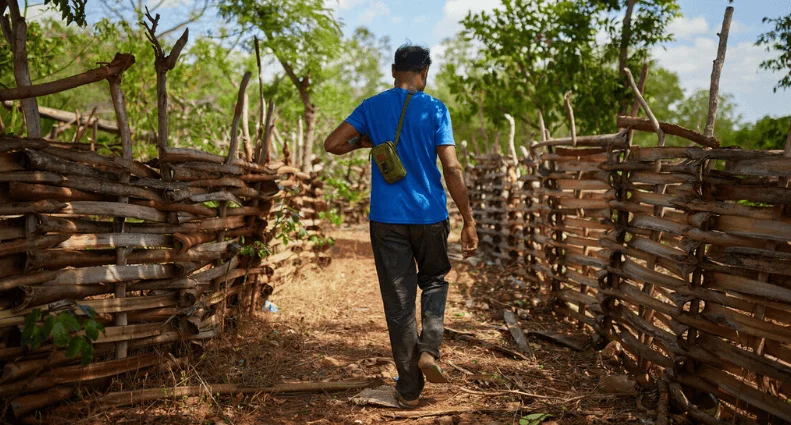Safeguarding — Keeping people safe at Oxfam
Keeping people safe and ensuring we do no harm is a vital part of our work. This page highlights the policies and processes Oxfam has in place to protect the people we work with from any form of abuse, exploitation, and harm.
What does Safeguarding mean for Oxfam?
At Oxfam, we are committed to the prevention of all forms of abuse and responding to all safeguarding concerns or allegations that come to our attention.
This means that we will do everything in our power to prevent sexual exploitation, abuse or harassment, or any form of child abuse from happening, and rigorously address incidents when they do occur.
One of the most important pillars of safeguarding is our Code of Conduct, which provides a framework within which all Oxfam employees and representatives, regardless of location, undertake to carry out their duties and to regulate their conduct.
Our safeguarding work is also underpinned by Oxfam’s values of Equality, Empowerment, Solidarity, Inclusiveness, Accountability and Courage, as we fight inequality to end poverty and injustice.
We know that living our values is every bit as important as what we achieve, and we are committed to being a safe and accountable organisation.
Child safeguarding — Keeping children safe
In the delivery of our work, we are committed to upholding the rights of children and safeguarding them against actions that place them at risk of violence and harm, including abuse or exploitation. The responsibility for maintaining child safe environments is a shared responsibility of all staff and associated personnel or representatives.
Oxfam Australia does everything it can within its control to safeguard children by creating awareness, ensuring preventative measures are in place, having robust child safeguarding policies and procedures, and supporting staff and partners to implement these. When issues that pose a risk to the safety and/or wellbeing of a child arise, we respond immediately and appropriately.
In line with the UN Convention on the Rights of the Child, we define a child as anyone below the age of eighteen years. Oxfam applies this principle across all countries where we operate.
You can access the Child Safeguarding Policy and Child Safeguarding Code of Conduct in the policy section below.
Our safeguarding approach
At Oxfam, we embrace a decolonial feminist approach our safeguarding work, striving to advance shifts in unequal power structures and systems that contribute to safeguarding issues. You can read more about our approach in the Oxfam Safeguarding Strategy.
We are continually strengthening our approach to safeguarding and promoting and upholding a culture that prioritises safeguarding awareness, prevention, reporting and response.
Read more about our Safer Recruitment and Screening processes
As part of our commitment to ensure that all staff understand and share our values, we have safe recruitment and screening practices in place. This includes integrity statements in our job ads and position descriptions, mandatory safeguarding questions during interviews and reference checks, conducting criminal history checks, safeguarding clauses in employment contracts, all staff and associated personnel are required to acknowledge they have read and understand Oxfam’s safeguarding policies and sign the Oxfam Code of Conduct and Oxfam Australia Child Safeguarding Code of Conduct. Safeguarding induction is part of employee onboarding, and all staff are required to regularly complete safeguarding training.
For further information on Oxfam Australia’s recruitment processes visit the Work with Us page.
Speak up
Safeguarding refers to sexual exploitation, sexual abuse, sexual harassment and any form of child abuse or exploitation.
Anyone (including Oxfam’s partners, people we work with, or members of the public) can raise a concern or make a safeguarding complaint without fear of retribution and in the knowledge that you will be protected from victimisation.
If you have experienced, witnessed, heard or suspect that misconduct has, or is about to occur, we encourage you to communicate this using one of the following options:

Email: keepingpeoplesafe@oxfam.org.au
This email is received by the Oxfam Australia Safeguarding Lead.

Report Misconduct Online
This online form is triaged to the Oxfam Australia Safeguarding Lead where cases are related to Australia or Timor-Leste. Online misconduct reports for cases in other countries may be triaged to a relevant Oxfam Confederation member. Privacy Notice.

Whistleblowing
You can make an anonymous report via Oxfam Australia’s Whispli portal. This is reviewed and triaged to the relevant lead for action.

Free Call Australia: 1800 088 110.
Select Option 4 – Safeguarding to be transferred to the Safeguarding Lead.
Integrity Reporting
Integrity and accountability are at the heart of Oxfam’s work. For Oxfam, integrity means the measures we take to prevent misconduct, abuse or exploitation, including sexual exploitation, abuse, or harassment, child abuse, as well as fraud or corruption, and immediately and appropriately
responding to concerns.
Oxfam reports annually on integrity data. Our Integrity at Oxfam report published in 2025 provides a snapshot of our key areas of progress and impact made between October 2023 and September 2024.
It reflects how integrity principles are embedded across our organization, shaping our culture, operations, and relationships with staff, partners, and communities. We are continually learning from our partners about risks and risk mitigation.
Oxfam Australia is committed to using your information responsibly. We are guided by the Australian Privacy Principles, as well as the codes that we adhere to. For more information, please visit our Privacy page.
